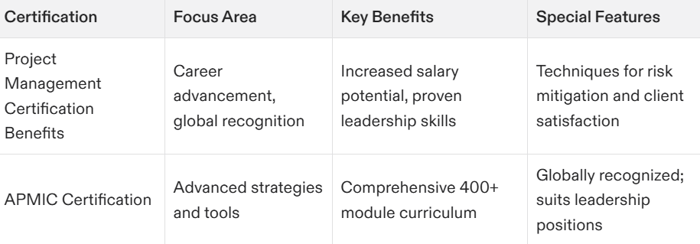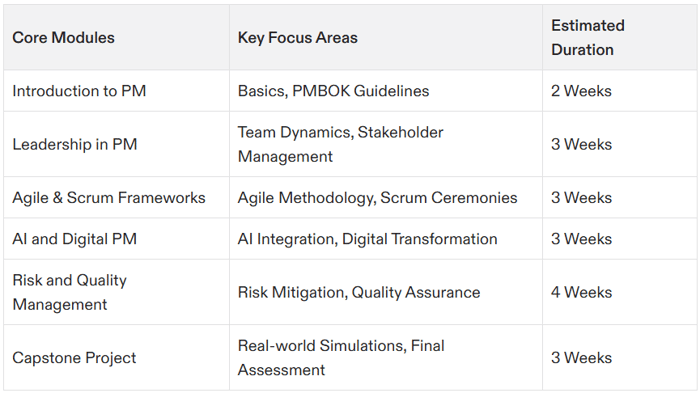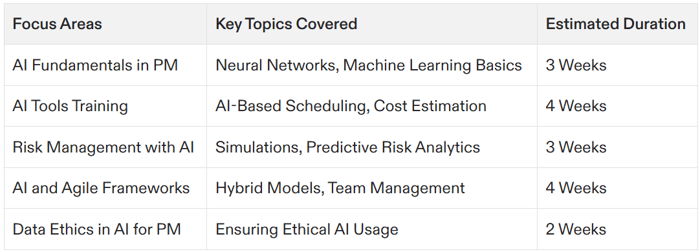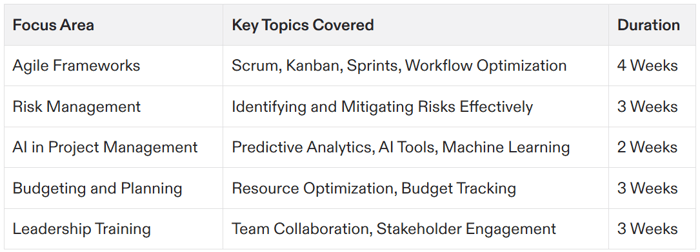Table of Contents
Understanding Project Management Certification Benefits
Investing in a project management certification can be a game-changer for your career. Certifications not only validate your skills but also position you as a highly qualified expert in a competitive job market. The Project Management Certification Benefits extend far beyond the basics of learning project management practices. They open doors to higher salaries, global opportunities, and authoritative leadership roles.
For professionals seeking career growth, understanding the true scope of Project Management Certification Benefits is essential. These certifications give you the tools, methodologies, and confidence to lead successful projects with measurable outcomes.
Why Pursue a Project Management Certification?
Enhanced Skills & Knowledge
Certifications refine your expertise in frameworks and methodologies like Agile, Scrum, Lean, and PMBOK. You gain a deeper understanding of project lifecycle management, budgeting, team alignment, and risk mitigation. With these tools, you’re equipped to lead initiatives that deliver value and exceed stakeholder expectations.
Increased Earning Potential
One of the major Project Management Certification Benefits is the direct impact on your earnings. Certified project managers can earn up to 25% more than their non-certified peers, with salary surveys consistently showing certification as a key differentiator for higher pay.
Career Advancement Opportunities
Certifications help you climb the corporate ladder faster. Employers prioritize certified professionals for senior roles such as Program Manager, Portfolio Manager, or PMO Director. These positions often demand a proven track record of successful project delivery, which certifications validate.
Global Recognition
Accredited project management certifications are acknowledged worldwide, making them a must-have for professionals looking to work in international markets or multinational companies. Certifications like the APMIC certification ensure your skills remain relevant across industries and geographies.
Mastery of Tools and Technologies
Project management certifications familiarize you with essential tools like Microsoft Project, Jira, and Trello. Mastery of these tools not only increases efficiency but also distinguishes you as a tech-savvy leader capable of managing complex projects.
Top Project Management Certification Benefits
1. Demonstrates Expertise
Holding a certification proves your technical competency and dedication to professional growth. It’s an official endorsement of your ability to manage projects effectively, boosting your credibility among stakeholders.
2. Reduces Project Risks
Certified professionals master risk assessment and mitigation. Through advanced techniques such as SWOT analysis and contingency planning, you minimize uncertainty and ensure smoother execution of projects.
3. Improves Stakeholder Satisfaction
A well-trained project manager delivers projects aligned with client and stakeholder expectations. Certifications help you understand stakeholder dynamics, ensuring transparent communication and timely delivery.
4. Enhances Leadership Skills
Leadership is at the heart of project management. Certifications include modules that focus on team management, conflict resolution, and motivation. These skills are highly valued in leadership roles and ensure project teams perform at their best.
5. Future-Proof Career
Technology advancements and market shifts demand constant learning. Certifications ensure you’re up to date with the latest methodologies, tools, and practices, keeping your career resilient against industry changes.
6. Professional Networking
Joining a certified professional community connects you with like-minded individuals, opening up opportunities for partnerships, mentorships, and career advancement.
FAQs
1. What Are the Key Project Management Certification Benefits?
The benefits of earning a project management certification are extensive and multifaceted. They serve as a testament to your expertise and commitment to professional growth. Key benefits include enhanced professional credibility, which assures stakeholders and employers of your ability to manage complex projects effectively. Certifications enable career advancement by opening doors to senior and specialized roles like Program Manager or Portfolio Director.
Certifications also boost your global mobility, allowing you to work across industries and countries by equipping you with universally recognized methodologies like Agile, Scrum, and PMBOK. Furthermore, they refine your ability to manage risks, ensuring smoother project execution and helping organizations achieve their strategic objectives. Overall, certifications are an indispensable tool for professionals aiming to lead competitive, high-impact projects successfully.
2. Do Employers Value Project Management Certifications?
Absolutely. Employers highly regard project management certifications because they indicate a professional's ability to deliver results-driven projects efficiently and effectively. Certified individuals are often seen as reliable, consistent, and technically skilled. This is especially critical for organizations that rely on project success to drive business growth or organizational transformation.
For example, a multinational firm may prioritize hiring certified project managers for roles involving cross-functional teams spread across multiple locations. Certifications prove that you possess the leadership skills, communication abilities, and technical know-how to manage such complex dynamics. They also fit perfectly with traits employers value—strategic thinking, time management skills, and a knack for problem-solving. Certified professionals frequently experience smoother career progression, larger responsibilities, and quicker promotions within their organizations.
3. How Do Certifications Increase Earning Potential?
Certifications have a measurable impact on earning potential. Globally, surveys indicate that certified project managers earn significantly more than their non-certified counterparts, often seeing salary increases ranging between 20% to 25%. This is because certifications endorse your expertise in handling high-budget projects and meeting deadlines while optimizing resources—qualities that employers are willing to pay a premium for.
For instance, a Senior Project Manager holding an accredited certification like APMIC with advanced risk management expertise is likely to command a higher salary than one with basic credentials. Employers value the efficiency, risk control, and innovation certified managers bring to the table, which positively impacts their bottom lines. Certifications also serve as bargaining tools during salary negotiations, positioning you as a competitive candidate with proven skills and updated knowledge.
4. Which Certification Is Right for Me?
Choosing the right certification depends on your career aspirations and the industry you want to work in. Entry-level professionals may benefit from foundational certifications like CAPM (Certified Associate in Project Management), which introduces project management principles. Mid-level managers aiming for expanded roles should consider APMIC certification or PMP (Project Management Professional), which are globally recognized and cover everything from project planning to decision-making and resource optimization.
For professionals seeking to specialize in certain areas, certifications like PMI-ACP (Agile Certified Practitioner) focus on Agile project delivery, whereas PRINCE2 emphasizes a process-driven approach often used in IT and public sectors. If your goal is to enhance leadership abilities and manage portfolios, APMIC stands out with its exhaustive curriculum of 400+ modules, preparing you for strategic management roles and cross-functional leadership. Always align your certification choice with your career trajectory for maximum impact.
5. Are Certifications Relevant Across Industries?
Yes, project management certifications are relevant and highly valuable in almost every industry. Their versatility stems from their transferable methodologies and tools, such as risk management, stakeholder alignment, and efficient resource allocation. For example, in the IT sector, certifications like Agile or Scrum ensure faster, iterative delivery of software projects.
The healthcare industry also benefits from certified project managers to streamline operations, implement technological upgrades, and maintain compliance with healthcare regulations. Construction sectors rely on certified professionals to oversee large-scale, multi-million-dollar projects, ensuring delivery within scope, time, and budget constraints.
Other examples include the finance industry, which appreciates certifications in risk assessment and change management for global mergers, and marketing, which uses project managers to execute campaigns effectively. Certifications like the APMIC certification prepare professionals for the challenges of these diverse industries, making them an indispensable asset no matter the field.
Certification Comparison
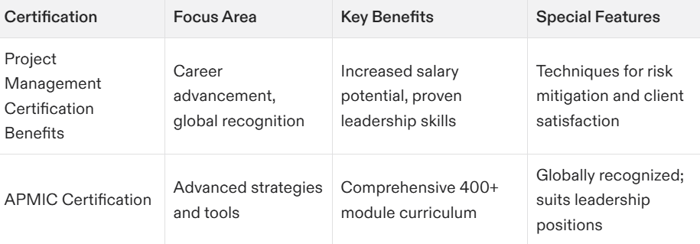
Pursuing professional certifications in project management is not just an investment in education—it's an investment in your future. Leveraging the Project Management Certification Benefits, especially through accredited programs like APMIC, ensures you're positioned as a top-tier professional ready to tackle complex challenges.
Start your career transformation today and uncover the limitless possibilities awaiting you in the dynamic world of project management!

